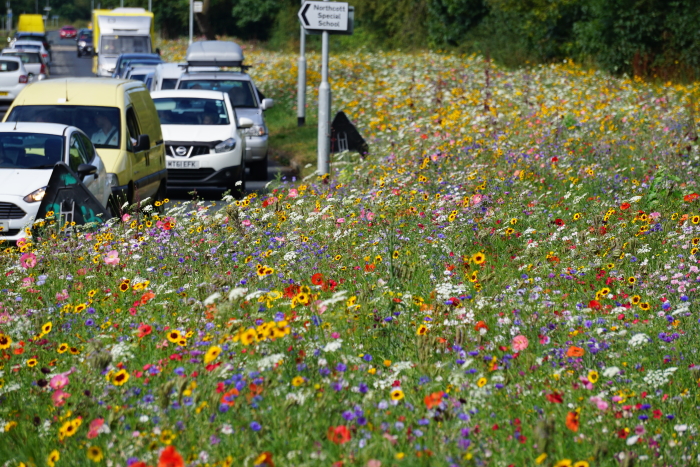Over the past few days as the verges in the village have been mown, the dreaded drone of the mowers and leaf blowers has been constant, and with it their indiscriminate spewing of carbon emissions and stinking air pollution.
In the U.K., many small towns and cities are “rewilding,” or allowing grass verges to grow during the summer, or planting native wild flowers to create mini-meadows. This has the triple benefit of reducing mowing costs and the associated pollution, sequestering carbon and allowing biodiversity to flourish.

I wonder if you know of any such efforts in Philipstown?
Zoe Tcholak-Antitch, Cold Spring

Great topic.
From some kind of group unconscious level in much of North America it is thought that energy can be and is to be used and wasted as if there is no tomorrow, as long as some driving force is making an economic profit out of it. And pollution in all its forms is something other people have to deal with….
I remember a time when lawn moving was done (sometimes by neighborhood youths as a jobs training and confidence-building scheme organized by their parents) by hand, using non-polluting mechanical movers. Now you see groups of gas-powered lawn mowers and small tractors towed around on the roads on ever larger and larger trailers, all to cut over-fertilized but nice green-looking lawns which are dangerously contaminated by toxic weed killers. As a consequence of these fertilizers and herbicides there are toxic algae blooms in the late summers on nearby lakes and estuaries, and there are skin rashes and far worse hazards we are only now learning about, including cancers, on the exposed but typically unsuspecting humans and wildlife in the area.
In the equations and theories of classical economics, the health of the environment is considered an “externality” (in other words, it is not considered). Biologist David Suzuki has written and spoken at great length of this phenomenon.
It is probably worth trying “mini-meadows” with native biology to see how they work out. My comment is that these environments should be planned so as to support predators of ticks and rodents, which, particularly in tall grasses in this part of the country, tend to transmit diseases. The potential impacts of a vast overpopulation of deer due to the near extermination long ago of their natural predators is also to be considered with respect to this scheme. Thus, it is a idea for qualified environmental biologists to work on. Do they exist? Is it a fundable project?
Rewilding with mini-meadows seems like a great idea. As I look around during the summer drought and see well-groomed, dry, brown lawns, or short lawns that are green only because of daily watering, I cannot help but think that there is something lacking in the approach. Personally, I have let the lawn grow undisturbed during much of the drought, and it is green and healthy and lush without watering or fertilizer. I neaten it up a little once in a while, and it looks OK. As a result, I see more leopard frogs, skinks and garter snakes, and bees and butterflies are thriving. I think Philipstown could benefit from a little rewilding.
As I left the Putnam County DMV in Brewster, I noticed peach trees beside the building. They are part of a wonderful pollinator garden of native plants, complete with small hives, bees of all types and monarch butterflies. [via Facebook]
Rewilding was tried on the meridian in Fishkill several years ago and ended up as weeds and trash. Nobody took responsibility for maintaining it. [via Facebook]